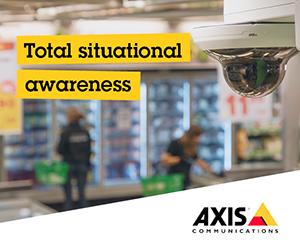Industry Focus
JAM Today and Tomorrow
How the Cost-of-Living Crisis Is Spreading Its Own Retail Crime Wave
It is the White Queen in Lewis Carroll’s second Alice book Through the Looking Glass and What Alice Found There who used the phrase: “The rule is, jam to-morrow and jam yesterday – but never jam to-day.” The meaning is an allusion to better times ahead but not in the here and now or, indeed, something that may or may not materialise in the future.
In 2019, before the pandemic turned the world upside down in much the same way as the topsy-turvy adventures that Alice encounters, Theresa May, prime minister at the time, also used the acronym JAM to describe an emerging sub-strata of hard-pressed families who had become known as the “JAMs” or those “just about managing,” representing a new generation of working poor, some of whom even had to turn to food banks to support themselves.
Wind the White Rabbit’s clock forward three years and the banding of those who would now fall into the classification of JAM, or find themselves in a precarious financial JAM, has dramatically expanded as the cost-of-living crisis squeezes the already static incomes that, rather like the JAM itself, are having to be spread even more thinly.
According to the think tank Resolution Foundation, the gap in the inflation experienced by the richest and poorest tenth of households grew to 1.5 percentage points in April 2022—the largest since records began in 2006—illustrating why low-income families are at the heart of the UK’s cost-of-living crisis.
The new analysis came off the back of the Bank of England’s official inflation data, a surge toward a double-digit percentage rise—its highest level in forty years—that was driven by rising household bills, with the energy price cap increasing by £693 (54 per cent) for the typical family in April and food prices increasing by 6.7 per cent (the highest level since 2011). With an extra upward pressure on the energy price cap this autumn, this figure is likely to increase even further.
Desperate times have called for desperate measures with growing evidence of a cost-of-living crime wave that sees retailers experiencing the stickier end of the knife with increased incidents of shoplifting and internal theft as well as exposure to online and Fraud as a Service (FaaS) scams where struggling families take advantage of “too-good-to-be-true” heavily discounted offers on everyday essentials.
Here, fraudsters who have harvested a rich crop of “profiles” from the Dark Web, including stolen credit card data, compromised email addresses, and other personal data, act like benevolent Robin Hood characters using social media platforms to offer weekly shopping baskets of essentials for as little as 10 per cent of their retail value in a modern-day equivalent of what has always operated as the “informal economy.”
This data has become the currency of fraud according to research from the Citizens Advice Bureau in June, which revealed that over 40 million people have been targeted by scammers during the cost-of-living crisis, a 14 per cent increase over 2021.
Apart from FaaS scams, other socially engineered heists reported included postal or courier services where property mules or delivery intercepts were used to steal products (55 per cent), someone pretending to be from the Government or HMRC (41 per cent), and scammers offering fake investments or financial “get-rich-quick” schemes (29 per cent).
“Off the Charts” Store Crime
The cost-of-living crisis has sparked a boom in “first-time” shoplifters, according to supermarket bosses. Thefts have soared since the beginning of the year and are continuing to increase in the wake of price rises in part caused by the war in Ukraine, which have left many consumers struggling to make ends meet.
As a result, retailers say theft levels are “off the charts so far this year,” according to analysts as well as anecdotal evidence from supermarket bosses in their trade journal, The Grocer.
Professional shoplifters tend to target high-value goods they can sell, such as alcohol, razors, and other items, but a new breed of thieves is stealing even the cheapest of products from the shelves, said the report. “One store manager reported shoplifting starting to rise across every day and low-value items ‘that you’d find in your weekly basket’ in contrast to the more regularly targeted luxury, high-cost items.”
Retail analyst Bryan Roberts, of Shopfloor Insights, said, “The situation is definitely getting worse” and the crime rate was “off the charts.”
Some shops have re-introduced the one-way entry and exit points that were around during COVID to help socially distance customers but are now there to make it easier to track who comes in and out. Others have beefed up security in terms of personnel and CCTV cameras.
One store boss told The Grocer, “The other day we stopped a pensioner who was trying to steal things like washing powder and shampoo. With the cost of living, people are going to have to start making choices.”
The Return of “Stealing to Eat”
Food poverty expert and Ulster University senior lecturer Dr. Sinéad Furey said this was not a new phenomenon. “We have seen this before in previous times of austerity or economic downturn.”
She added, “The return of ‘stealing to eat’ instead of being able to ‘afford to eat’ is yet more proof that we need effective policy solutions that put sufficient income in people’s hands in a dignified way so that poverty and resorting to crime do not become mainstream means of securing the most basic essentials for living.”
Research by the Food Foundation showed that in April, 7.3 million UK adults skipped meals, reduced meal size, or went without food for a day due to costs.
Shore Capital analyst Clive Black said the “temptation to shoplift is likely to grow for some” as prices rise. He added, “More straitened times bring a greater risk, and in some cases, need for shoplifting, which is a notable problem for shopkeepers, especially since the Police are disinterested participants, despite stores paying extortionate rates.
“The Government shows little real interest in such matters whilst the courts and penal system cannot cope with serious crime, never mind more mundane matters such as thieving from a store,” Clive said. “It is a symptom of a failed system, sadly. So, within limits, shopkeepers have to try and control matters.”
The reported “rise” comes as some Police officers have been told to use their “discretion” when deciding whether to prosecute shoplifters amid the crisis. Andy Cooke, the new Chief Inspector of Constabulary, suggested officers should weigh up whether it was best to haul those who steal to eat before the courts because the rise in cost-of-living would “trigger an increase in crime.”
Andy insisted that he didn’t want to be seen as “giving carte blanche for people to go out shoplifting” or advocating an amnesty for people who commit crimes of poverty, but his intervention could yet enrage retailers who warn it is “irresponsible to suggest that shoplifting should not be treated seriously.”
Past economic slumps have led to a rise in offences such as theft, Andy added. “It’s one of the great things about being a Police officer,” he said. “You’re allowed to make your own decisions in relation to all of these issues. It’s not a new thing.”
His comments echo those of Donna Jones, Police and Crime Commissioner for Hampshire and the Isle of Wight. Last year she suggested that persistent shoplifters should be spared jail and mooted the idea that retailers could pay for the rehabilitation of drug offenders who steal to feed their habit.
But Tom Ironside of the British Retail Consortium rejected the idea, saying, “It is irresponsible to suggest that shoplifting should not be treated seriously. When confronted, shoplifting often results in violence and abuse against retail staff, many of whom are women, and it costs retailers £2.5 billion a year, which includes the cost of the actual theft as well as security measures.”
Retailers are already experiencing higher levels of shoplifting because of the crisis. Matthew Day, a director of Gatekeeper Systems, which specialises in preventing push-out crime through its Purchek wheel-locking technology, said, “Last year we published an independent study into push-out crime with Emeritus Professor Adrian Beck that suggested it accounted for around 4 per cent of all unknown shrink.
“This year, figures are likely to be significantly higher as many retailers are already seeing greater levels of push-outs—it’s very much the crime they perhaps do not realise they have as thieves use the trolley as a form of camouflage to disguise their crime, even to the point of going through the self-checkout aisles to avoid detection.”
Matthew added, “It used to be high-value items that were being stolen this way, but now the trolley is being used to steal a wide range of essentials as well, because of the cost-of-living crisis—it’s right across the board. The beauty of the technology is that it is agnostic, it does not profile customers, but simply stops the trolley from leaving the store. It also avoids confrontation because those involved are more likely to walk away before security teams or store colleagues arrive at the scene to retrieve the trolley and the stock—what we call ‘flight, not fight.’”
Cost-of-living walkouts are not the preserve of stores, but also a growing modus operandi for a different breed of “drive off” theft sometimes known as “bilking.” The price of petrol and diesel, now exceeding £2 per litre in some areas, has meant increases in drive-offs or customers presenting with “no means of payment” where they have “forgotten” their wallets.
Metro Security, a retail specialist in automatic number plate recognition (ANPR) and data analytics in and around both manned and unmanned fuel forecourts, has also seen a focus on organised fraudsters using pay-at-the-pump terminals as a means of testing on an industrial scale whether stolen or compromised credit cards have been cancelled before filling up vehicles and large hidden containers on the proceeds.
But, according to Technical Director Dean Wallace, another trend has emerged, where drive-offs from attended forecourts have been linked to a cheaper form of payday loans. “They fill up their cars and buy something small in-store and leave knowing that it will be several weeks before the fine will come through with the ANPR evidence, which will be less than a typical payday loan and the value of the fuel at the present cost rates—and they won’t have to pay it immediately, it will be at least a month later,” he said.
Retailers are getting wiser to the different nuances of customer duplicity by also using intelligence-led technology and artificial intelligence (AI) to better understand behaviours.
Amberstone Security, one of Europe’s biggest retail solutions providers, has partnered with AI-driven product concealment technology provider Veesion. Fully GDPR-protected, the plug-and-play technology detects suspicious behaviours that may lead to concealment of items and ultimately shoplifting before it occurs and learns as it looks. The technology optimises often under-utilised legacy cameras to avoid additional capital outlay, which appeals to many retailers because of its more cost-effective identification of cost-of-living crime.
Andrew Rees, the former senior manager for operational security at Asda and now an account director for Veesion at Amberstone, said, “A lot of my customers are trialling it because of the perfect storm that we find ourselves in due to the current economic climate with the shift in the number of people stealing for profit to those doing so for essentials. It is intelligence-led, which helps retailers better deploy their resources in a more focussed way.”
Record Levels of Violence
It’s not just theft that is of concern to retailers as the cost-of-living crisis bites. There had already been concern over record levels of violence and aggression because of the pandemic. But there have been authoritative warnings around more violent crime emerging.
London Mayor Sadiq Khan said progress on reducing violence—a fall of 7 per cent in knife crime and 18 per cent reduction in gun-related offences since 2021, according to the Office of National Statistics—could be reversed by pressures created by the current economic climate.
“We must acknowledge that the spiralling cost of living could make things even more challenging and even risks taking us backwards,” he said. “The level of violence remains far too high,” despite the number of incidents having fallen since before the pandemic, and he fears that spiralling costs will deepen deprivation and poverty, which—along with a lack of positive opportunities for young Londoners—could be a driver of violent crime.
Violence has been a key factor in many shoplifting offences, many involving weapons. In February of this year, a two-day respect-for-store-colleagues initiative in Birmingham involving retailers and West Midlands Police targeting anti-social behaviour through dispersal orders recorded an increased cache of concealed weapons, including those used in martial arts and machetes that were seized by officers as part of the campaign.
Retailers are also looking to the latest developments in AI and learned behaviour to detect and deter incidents of violence in-store. Global analytics specialist SAI has to this end developed SAI Safe to analyse many thousands of hours of customer video—some of which is very disturbing—to build models that interpret interactions, with resulting algorithms accurately identifying violence and aggression and triggering alerts to security officers.
Evidence from each incident is then automatically prepared for investigation by law enforcement agencies, and internal programmes that provide care and support for affected colleagues are also triggered into action as a result.
In addition, detection and prevention of theft can be accessed with the SAI Alerts app, which helps to deter high-risk individuals from entering or returning to a store.
“SAI Safe is part of our commitment to develop AI that puts people first. While this is an ongoing process for us, we understand that creating safe workplaces within the retail industry is about more than technology—it requires a willingness to pursue positive change,” said Chris Bell, head of marketing for SAI.
“We all know that incidents of violence and aggression are climbing, but reporting of it is patchy to say the least. This technology can pick up aggressive behaviour in a fraction of a second before it escalates, as well as being able to send a video to a security operations centre, for example.”
One of the key learnings of the AI programme, Chris argues, was that 90 per cent of all violence and aggression incidents occur at the store entrance as the suspected shoplifter is attempting to leave. “We found that if challenges occurred when inside the store, they were much more likely to be compliant. It’s almost like that if they can smell the fresh air, they feel that they are almost home and dry, and incidents here are more likely to escalate.”
Such patterns are useful learnings that can provide vital training and can be shared with store managers, regional managers, and the Police to reduce incidents of harm.
Internal Fraud
External theft is always a focus of retail investigation, but the impact of internal fraud—theft by colleagues in positions of trust—is still regarded as a taboo topic, largely because it can highlight poor recruitment or vetting procedures or process vulnerabilities within a business that allow colleagues to “get away” with impunity as in most cases they steal “little and often” to avoid data mining flags and detection.
Internal fraud is believed by many to represent a higher level of dishonesty than external theft, although the latter is where a large proportion of the loss prevention resource is dedicated. The cost-of-living crisis has changed this landscape as otherwise surreptitious employees break cover out of need with sometimes brazen abuse of refund or staff discount policies.
Alan Grocott, the UK Instructor for the globally recognised Wicklander-Zulawski (WZ) non-confrontational interviewing techniques, said more and more employees are finding themselves in difficult positions.
“Employees can get themselves into difficulty and find themselves tempted to turn to dishonesty, but many companies have put in place alternative strategies to help struggling colleagues who would not ordinarily even consider turning to crime to get out of the problems they find themselves in,” said Alan, a former head of LP at fashion brand Next.
“Today there are lots of things that businesses are doing to support colleagues, such as short-term loans, for example, but if after all the support offered, they still decide to be dishonest, they have made the choice and the consensus of opinion is that they will be treated like any other dishonest employee.
“We all understand that good, hardworking people can find themselves in a difficult situation and are tempted to do things they would never ordinarily do, and whilst it is okay for us to say we understand, it is clear that it’s never okay to steal,” he added.
The WZ method, which is directed at LP professionals, as well as audit, HR, and health and safety professionals, aims to get to the truth regarding suspicions in a non-confrontational way, using a process of rapport-forming and explanatory and exploratory statements to arrive at the truth. The interviewing technique has been used effectively across the world since the early 1980s, and WZ is now internationally recognised as one of the market leaders in interview training.
Internal fraudsters, like external thieves, may be just about managing or find themselves in another kind of financial JAM not of their own making, as their wages will no longer spread to cover their bills, and their income remains static as a result of the global inflationary and geo-political pressures of disagreements and outright conflict in Europe.
In a post-pandemic world of greater mental health awareness, stealing to feed a need rather than greed can be as surreal an experience as Lewis Carroll’s alternative universe of Alice, rather than Malice, in Wonderland. But the endgame of a criminal record and lost employment seems a long way away from their rational considerations and action, and the JAM today will continue to be a bigger JAM tomorrow.





